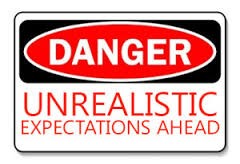
“Jeff, I’ve been working with this one donor of mine for four months and she has only gone from a $1,000 gift to three gifts totaling $8,500. This donor has a ton of money, and I thought I would be much further along by now.”
This is an actual quote from an MGO that I had been working with several months ago. I had to tell her that going from one gift of $1,000 to three that totaled $8,500 was fantastic, and she was obviously moving the donor in the right direction.
This MGO had unrealistic expectations.
And then just a few weeks ago, I was in a board meeting with a large organization and the CEO asked me how long to expect to wait before the major gift program would really start producing.
I told him between 18 and 24 months. But given that they had a number of donors who had been cultivated and stewarded well already, they should see some good revenue coming in the short term as well, because they were now actually soliciting donors. But for the entire program to really take root and start producing good revenue consistently, it would take 18-24 months.
The CEO was dumbfounded. “18-24 months! How can that be? We have donors who have tremendous capacity. They should be giving big now!”
Obviously, this CEO had unrealistic expectations.
Finally, there was the Development Director that I was working with several years ago, whose philosophy of major gifts was that he would write thank you letters, send nice notes of encouragement, and deliver gifts to his donors’ doors on holidays – but he would never ask for a gift.
The result of that was a “major gift program” that had 75% value attrition rates year over year. This is probably one of the worst major donor files we have ever seen! When I asked why he never asked a donor for a gift, and he said proudly, “Jeff, I’ve never asked a donor for a gift in 25 years, and I just expect that the donor will give on their own if they really want to give.”
No wonder this guy had worked for almost a dozen different organizations in 25 years.
He really had unrealistic expectations.
Richard and I find that this is very common across the non-profit sector. There are unrealistic expectations everywhere.
Here are some reasons for these unrealistic expectations:
- Pressure to go after the money — This comes from both leaders and managers who pressure MGOs; but it also comes from the MGOs themselves who don’t focus on the donor relationship, but rather want to get that money in the door.
- Uneducated about major gifts — Richard and I have found that many CEOs and even Development Directors are not well-versed in major gift strategy. They may come from an aggressive direct-response background, and they think that once you unleash a major gift strategy, money should be flowing in immediately, like they do when they send out an appeal letter.
- People are impatient. — The culture we live in wants immediate gratification. We have almost become hardwired as a people to be this way. Yet in major gifts, when it’s done correctly we know it takes time to get off the ground. Why? Because it’s all about building relationships. You build relationships to create trust and understanding. That does not happen overnight.
- You don’t understand donor behavior. — This is like the development director in my story – that guy didn’t understand that donors need to be asked to do something. Yes, sometimes donors give of their own volition. But that is actually rare. Donors want to be asked. The old adage “You don’t get if you don’t ask” is true. It’s amazing how many development professionals don’t get this.
So what are realistic expectations for major gifts?
- Timeline – If you are starting a new major gift program, you need to allow 18-24 months before you really start to see consistent net revenue gains.
- Structure – If you now have set up the right structure, but you have donors who have not previously been stewarded and cultivated consistently, you should expect a few “low-hanging fruit” gifts to arrive in the short-term, because you are now asking.
- Soliciting – If you want large donations from major donors, you have to personally ask them for it. You may get some donations that are unsolicited, but they will not be transformational The expectation for major gifts is that you will look a donor in the eye and ask for a significant gift that will make an impact in both the donor’s life and that of your organization.
If you are doing major gifts the right way, these are the realistic expectations. So examine what current expectations you may have about your program, and realign them to be realistic. You will be much more productive and less anxiety-ridden – and your relationships with your donors will be stronger.
Jeff
Categories: Expectations, Major Gifts, Major Gift Officers
Tags: Management, Leadership, Giving






0 Comments